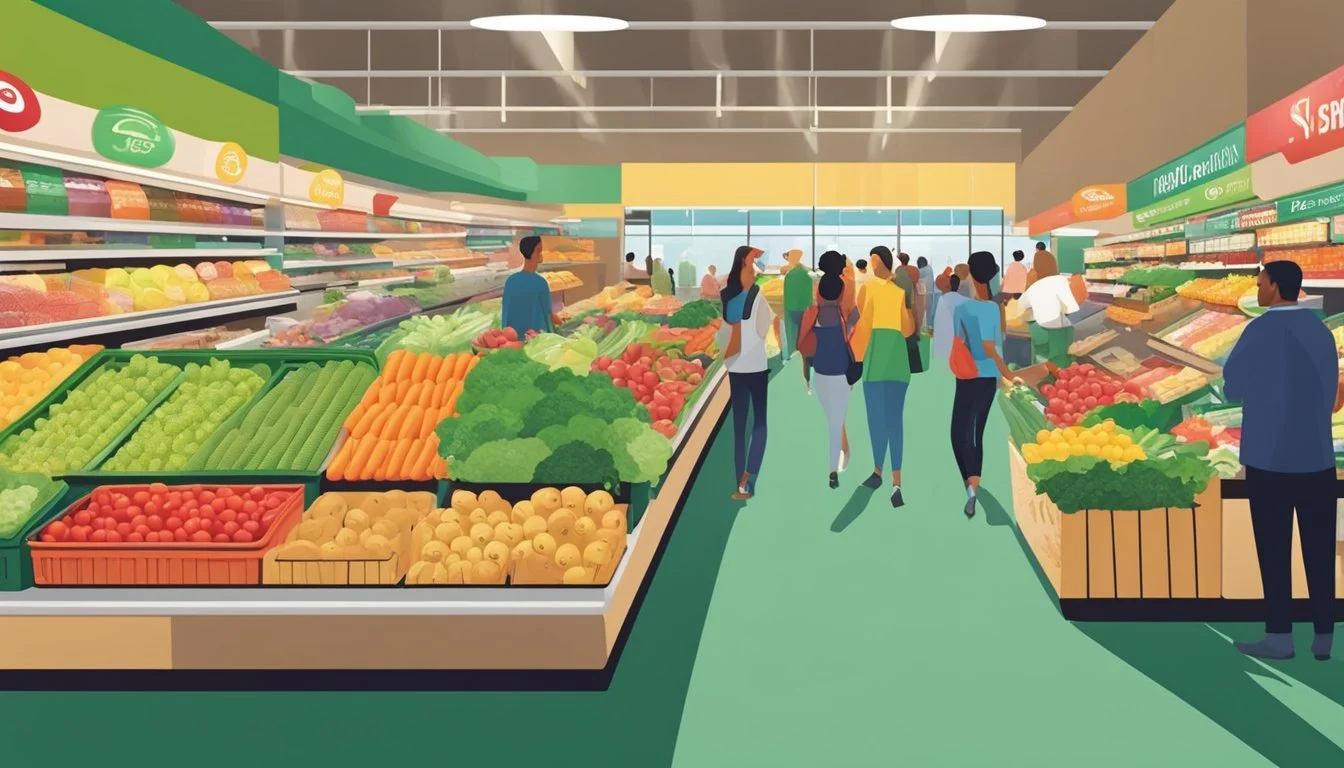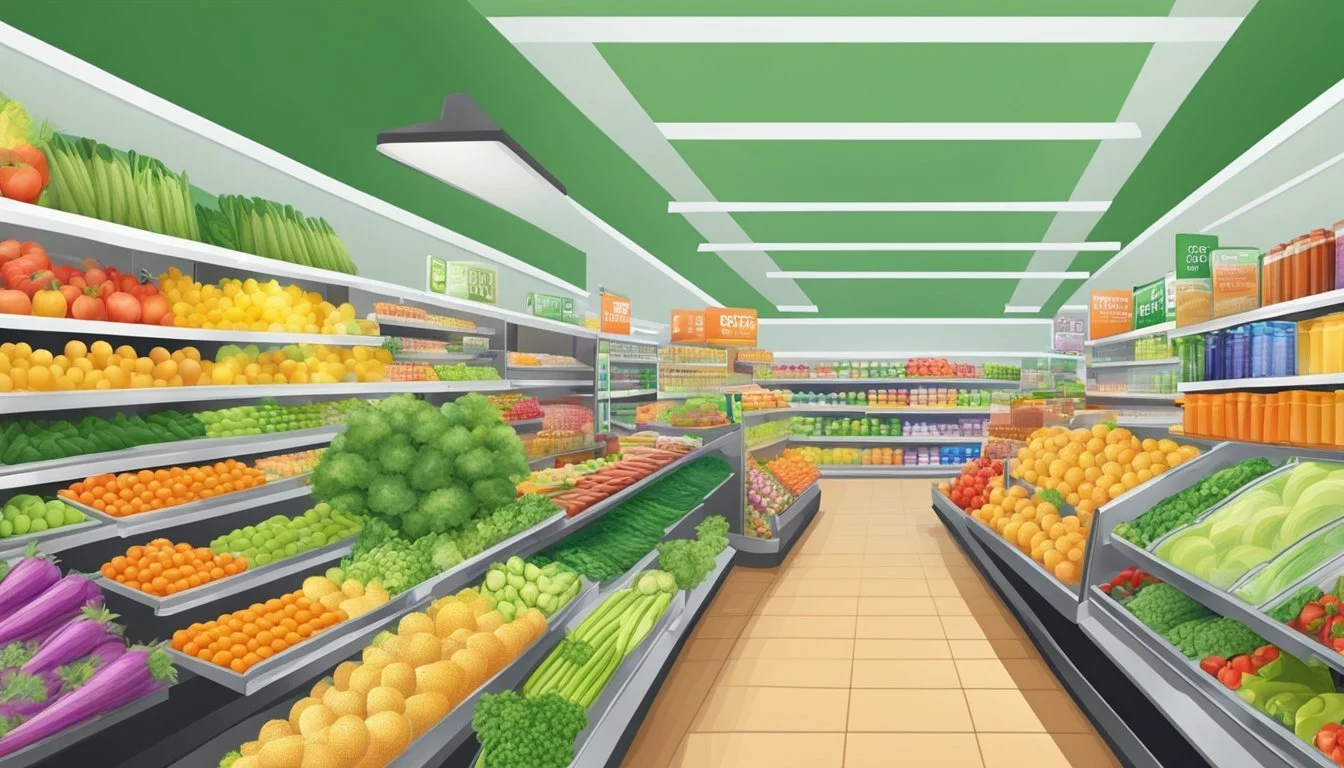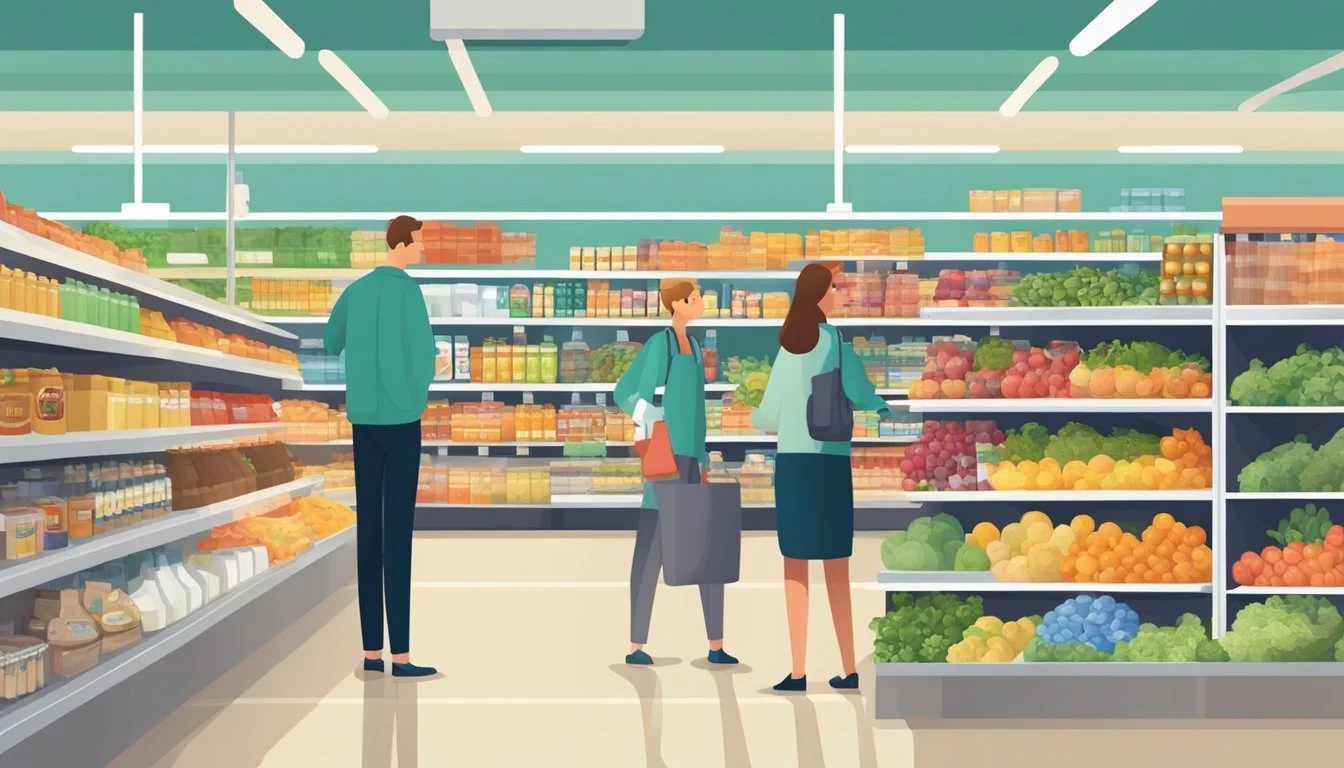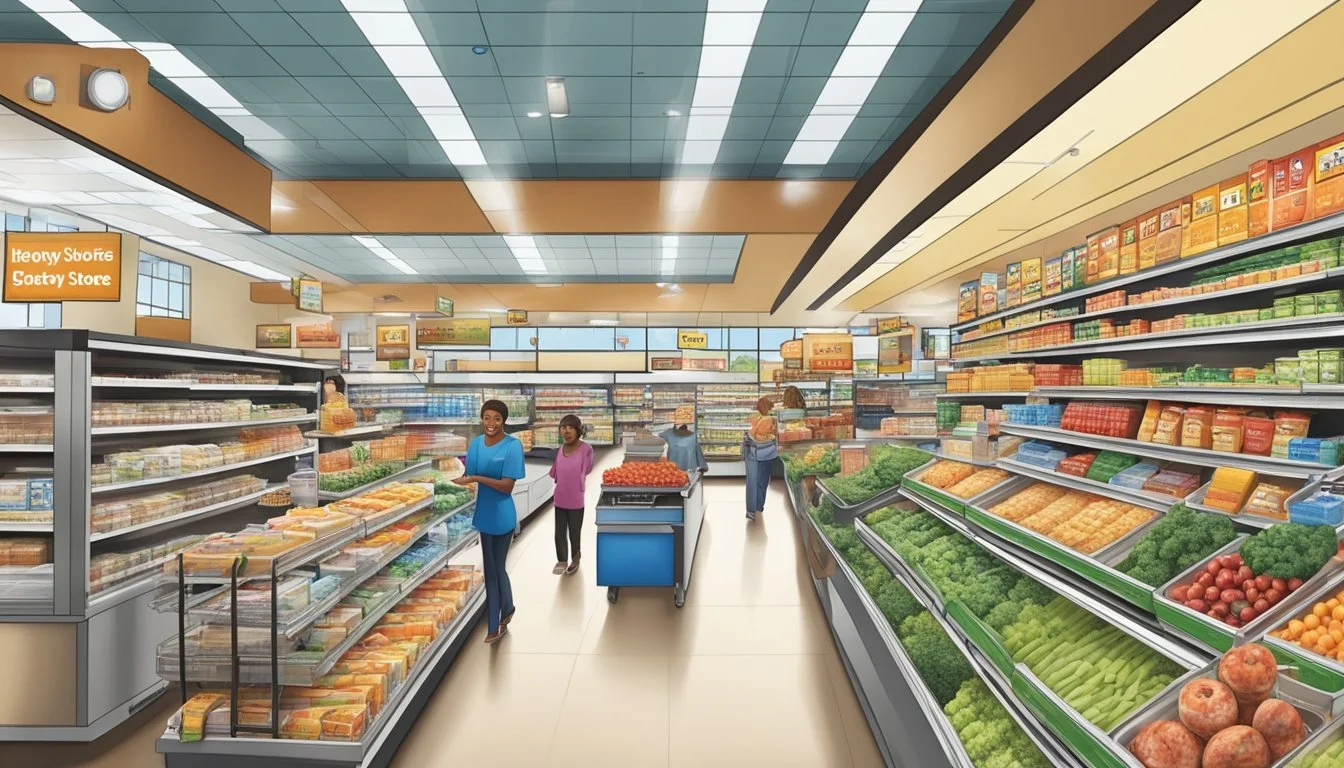Food Lion vs H-E-B
A Comprehensive Comparison of Prices, Quality, and Service
When it comes to grocery shopping, the choice of store can significantly impact both your wallet and your culinary experience. Food Lion and H-E-B are two prominent players in the American supermarket landscape, each with its own unique offerings and approach to customer service.
Food Lion, a familiar name in many Eastern and Southeastern states, has built a reputation for competitive pricing and convenient locations. On the other hand, H-E-B, deeply rooted in Texas culture, has become synonymous with quality products and innovative store layouts. While Food Lion excels in affordability with prices up to 12% lower than average, H-E-B stands out for its superior product selection and customer-centric approach.
The battle between these two grocery giants extends beyond mere price comparisons. H-E-B's commitment to offering a diverse range of high-quality, locally-sourced products has earned it a loyal customer base in Texas. Meanwhile, Food Lion's focus on everyday low prices and accessibility continues to attract budget-conscious shoppers across multiple states. The choice between the two ultimately depends on individual preferences for price, quality, and shopping experience.
Company Overviews
H-E-B and Food Lion are two prominent grocery chains with distinct histories and regional focuses. Each has carved out its own niche in the competitive supermarket landscape.
History of H-E-B
H-E-B traces its roots to 1905 when Florence Butt opened a small grocery store in Kerrville, Texas. Her son Howard E. Butt later expanded the business, giving rise to the H-E-B name.
The company grew steadily throughout the 20th century, becoming a major force in Texas retail. H-E-B is known for its innovative store concepts and strong focus on local products.
Today, H-E-B operates over 400 stores across Texas and Mexico. The chain is praised for its fresh produce, quality meats, and unique product offerings.
Food Lion: An Overview
Food Lion was founded in 1957 as Food Town in Salisbury, North Carolina. The company rebranded to Food Lion in 1983 and expanded rapidly in the following decades.
Food Lion built its reputation on low prices and convenient locations. The chain faced challenges in the 1990s but has since rebounded through strategic renovations and improved customer service.
Currently owned by Ahold Delhaize, Food Lion operates approximately 1,100 stores across 10 states in the Mid-Atlantic and Southeast regions.
Regional Footprints
H-E-B dominates the Texas grocery market, with a strong presence in major cities like Houston, San Antonio, and Austin. The company has resisted expansion beyond Texas, focusing on deepening its roots in its home state.
Food Lion's territory spans the Mid-Atlantic and Southeast, with stores in states like Virginia, North Carolina, and Georgia. The chain maintains a strong presence in smaller towns and rural areas.
Both companies tailor their offerings to local preferences. H-E-B emphasizes Texan products, while Food Lion adapts to regional tastes across its diverse footprint.
Product Offerings
Food Lion and H-E-B both offer a wide range of grocery products, but their selections and quality can differ significantly. Each store has its own strengths in various departments, catering to different customer preferences and needs.
Produce and Freshness
Food Lion provides a standard selection of fruits and vegetables at competitive prices. Their produce section focuses on common items that meet everyday needs. H-E-B, on the other hand, is known for its extensive produce offerings. The Texas-based chain often features local and seasonal fruits and vegetables.
H-E-B's commitment to freshness is evident in their frequent restocking and quality control measures. They also offer a wider variety of organic produce options compared to Food Lion.
Food Lion's produce tends to be more budget-friendly, making it a go-to choice for price-conscious shoppers. However, H-E-B's higher-quality standards and broader selection often justify their slightly higher prices for many customers.
Meat and Seafood
H-E-B excels in its meat and seafood departments. They offer a diverse range of cuts and types of meat, including prime beef and specialty items. Their seafood counter typically features a variety of fresh fish and shellfish options.
Food Lion's meat selection is more basic but still covers essential items. Their seafood offerings are generally limited to popular choices and frozen options.
H-E-B often partners with local ranchers and fishermen, providing customers with fresher, locally-sourced products. Food Lion relies more on national suppliers for their meat and seafood inventory.
Dairy and Bakery
Both stores offer a full range of dairy products, including milk, cheese, yogurt, and eggs. H-E-B tends to have a larger selection of specialty and artisanal cheeses.
In the bakery department, H-E-B stands out with its in-store bakeries producing fresh bread, pastries, and cakes daily. They often feature unique, regional baked goods.
Food Lion's bakery offerings are more limited, focusing on pre-packaged items and a smaller selection of fresh-baked goods. Their dairy section covers essentials but may lack the variety found at H-E-B.
Organic and Natural Products
H-E-B has made significant strides in expanding its organic and natural product lines. They offer a wide range of organic produce, meats, dairy, and pantry items. Their stores often feature dedicated sections for natural and health-focused products.
Food Lion's organic and natural offerings are more limited. While they do stock some organic options, the selection is not as extensive as H-E-B's. Food Lion focuses more on providing conventional products at lower prices.
H-E-B also carries more specialty diet items, catering to vegan, gluten-free, and other dietary preferences. Food Lion's selection in this area is typically more basic, covering only the most common dietary needs.
Price and Value
H-E-B and Food Lion both strive to offer competitive pricing and value to their customers. Each store employs different strategies to attract and retain shoppers through affordable options, loyalty programs, and private label products.
Everyday Low Prices and Deals
H-E-B focuses on maintaining competitive prices across its product range. The Texas-based chain regularly offers weekly specials and digital coupons to help customers save money. Food Lion, on the other hand, has positioned itself as a low-price leader in many of its markets. According to recent surveys, Food Lion's prices were found to be approximately 12% lower than the average prices at other grocery stores in certain regions.
Both retailers frequently run promotional campaigns and markdowns on popular items. H-E-B's "Meal Deals" provide bundled ingredients at discounted prices, while Food Lion offers "Hot Sales" on select products throughout the store.
Loyalty Programs and Rewards
H-E-B's loyalty program, called "H-E-B Points," allows customers to earn points on purchases that can be redeemed for discounts on future shopping trips. The program also provides personalized coupons and exclusive offers based on shopping history.
Food Lion's "MVP" card offers immediate discounts on specially marked items throughout the store. Cardholders receive access to digital coupons and can earn "Shop & Earn" rewards for additional savings on frequently purchased products.
Both programs are free to join and can lead to significant savings for regular shoppers.
Private Label Products and Brands
H-E-B has developed a strong reputation for its extensive line of private label products. These store brands, such as "H-E-B Organics" and "Hill Country Fare," offer quality alternatives to national brands at lower price points.
Food Lion also offers a range of private label options under brands like "Nature's Promise" for organic and natural products, and "Food Lion" for everyday essentials. These products typically provide savings of 20-30% compared to national brand equivalents.
Both retailers use their private label offerings to provide value-conscious shoppers with affordable options across various product categories.
Store Experience and Design
Food Lion and H-E-B offer distinct shopping environments, each with unique features that cater to different customer preferences. Their approaches to store design, cleanliness, and digital integration shape the overall experience for shoppers.
Cleanliness and Layout
Food Lion stores typically feature a straightforward layout with wide aisles and clear signage. The chain emphasizes cleanliness, with regular maintenance schedules to ensure a tidy shopping environment.
H-E-B stores often boast a more elaborate design, incorporating local themes and artwork. Their layouts tend to be more spacious, with dedicated sections for specialty products and prepared foods.
Both chains prioritize organization, but H-E-B's attention to aesthetic details often results in a more visually appealing atmosphere.
Shopping Experience and Convenience
Food Lion focuses on efficiency, with a compact store format that allows for quick shopping trips. Self-checkout options are available in many locations to reduce wait times.
H-E-B provides a more immersive experience, featuring in-store sampling, cooking demonstrations, and a wider range of specialty departments. Their stores often include pharmacies, bakeries, and expanded deli sections.
H-E-B's larger format can be more time-consuming to navigate but offers a greater variety of products and services under one roof.
Digital and E-Commerce Innovation
Food Lion's mobile app allows customers to create shopping lists, clip digital coupons, and track rewards points. The chain offers online ordering with curbside pickup options at select locations.
H-E-B has invested heavily in digital innovation. Their app includes features like scan-and-go technology for in-store shopping. The chain's e-commerce platform is more robust, offering both delivery and curbside pickup services in many areas.
H-E-B's digital offerings are generally more advanced, providing a seamless integration between online and in-store experiences.
Customer Services and Satisfaction
H-E-B and Food Lion prioritize customer satisfaction through various services and support options. Both chains strive to meet diverse dietary needs and gather feedback to improve their offerings.
Meeting Dietary Needs
H-E-B caters to health-conscious shoppers with an extensive selection of organic, gluten-free, and specialty diet products. Their stores feature dedicated sections for these items, making it easy for customers to find suitable options.
Food Lion also offers a range of healthier choices, including organic produce and natural products. They provide clear labeling for allergen-free and special diet foods to assist customers with specific dietary requirements.
Both chains stock plant-based alternatives and low-sodium options to accommodate various health needs. H-E-B's larger stores typically offer a wider variety of specialty diet products compared to Food Lion.
Customer Support and Services
H-E-B is known for its exceptional customer service. They offer:
Dedicated customer service desks in each store
Curbside pickup and home delivery options
A mobile app for digital coupons and shopping lists
Food Lion provides:
Self-checkout lanes for quick transactions
A mobile app for digital coupons and weekly ads
Online ordering with in-store pickup at select locations
Both chains train their staff to assist customers with product inquiries and special requests. H-E-B's larger workforce often allows for more personalized attention in-store.
Survey Results and Customer Feedback
H-E-B consistently ranks high in customer satisfaction surveys. In recent studies, they tied for first place among supermarkets with a score of 85 out of 100.
Food Lion, while not at the top, has shown improvement in customer satisfaction ratings. They focus on gathering feedback through:
In-store surveys
Online review platforms
Social media engagement
H-E-B's loyalty program, points-based rewards, and personalized offers contribute to high customer retention rates. Food Lion's MVP Card program provides discounts and personalized deals to encourage repeat visits.
Both chains actively respond to customer feedback, implementing changes based on shopper suggestions and preferences. H-E-B's stronger performance in satisfaction surveys suggests a more effective approach to meeting customer expectations.
Market Position and Competition
H-E-B and Food Lion occupy distinct positions in the competitive grocery retail landscape. Their market presence, brand strategies, and relationships with competitors shape their roles in the industry.
Competitive Landscape in Grocery Retail
H-E-B dominates the Texas market, holding a 23.4% market share in Houston as of early 2020. This puts the chain ahead of retail giant Walmart, which held 21.1% of the market. H-E-B's strong regional presence has challenged major players like Kroger, Safeway, and Aldi.
Food Lion, on the other hand, operates primarily in the Mid-Atlantic and Southeastern United States. The chain exited the Texas market in 1997, partly due to intense competition from H-E-B.
In the broader grocery landscape, both chains face competition from diverse retailers. These include traditional supermarkets, discount chains, and specialty grocers like Whole Foods Market and Trader Joe's.
Comparison With Other Grocery Chains
H-E-B stands out for its customer preference, ranking as the top grocery retailer in dunnhumby's Retailer Preference Index. This places H-E-B ahead of major competitors like Amazon, Costco, and Kroger.
Food Lion, while not as highly ranked, maintains a solid presence in its operating regions. The chain competes with regional players like Publix and national retailers such as Walmart.
Both H-E-B and Food Lion face pressure from discount chains like Aldi, which offer competitive prices on everyday essentials. They also compete with warehouse clubs like Costco, known for bulk purchasing options.
Brand Value and Positioning
H-E-B has built a strong brand around quality, cleanliness, and community involvement. The chain emphasizes fresh produce and high-quality essentials, positioning itself as a premium yet accessible option.
Food Lion focuses on offering low prices and convenient locations. The chain's brand strategy centers on providing affordable options for everyday grocery needs.
Both retailers have adapted to changing consumer preferences by expanding their organic produce offerings. However, H-E-B's selection tends to be more extensive, competing more directly with specialty retailers like Whole Foods Market.
H-E-B's private label products have gained popularity, enhancing its brand value. Food Lion also offers store-brand items, though they may not have the same level of recognition as H-E-B's private labels.
Sustainability and Community Impact
Both Food Lion and H-E-B have implemented initiatives to reduce their environmental footprint and support local communities. Their efforts span sustainable practices, partnerships with local producers, and community outreach programs.
Environmental Initiatives
Food Lion has set ambitious sustainability goals, aiming to reduce food waste and greenhouse gas emissions. The company pledges to achieve net-zero carbon emissions by 2040 and plans to increase energy efficiency in its stores.
H-E-B focuses on recycling and waste reduction. The grocery chain has implemented a comprehensive recycling program, diverting millions of pounds of waste from landfills annually. H-E-B also invests in energy-efficient technologies and sustainable building practices for its stores.
Both retailers have made commitments to sustainable seafood sourcing. Food Lion partners with sustainable fisheries, while H-E-B sources a significant portion of its seafood from the Gulf of Mexico.
Support for Local Producers
Food Lion and H-E-B prioritize relationships with local farmers and producers. This approach supports local economies and ensures fresher products for customers.
H-E-B's "Go Local" program showcases Texas-made products in its stores. The company works closely with small businesses to bring their goods to market.
Food Lion partners with local farmers to source fresh produce. The retailer's "Local Goodness" program highlights products from nearby growers and artisans.
Community Involvement and Outreach
H-E-B is known for its disaster relief efforts in Texas. The company deploys mobile kitchens and provides essential supplies during emergencies.
Food Lion focuses on fighting hunger in its communities. The "Food Lion Feeds" program has donated millions of meals to food-insecure families.
Both retailers support education initiatives. H-E-B sponsors literacy programs, while Food Lion provides grants to local schools.
Community volunteerism is encouraged at both companies. Employees participate in local service projects and charitable events throughout the year.







